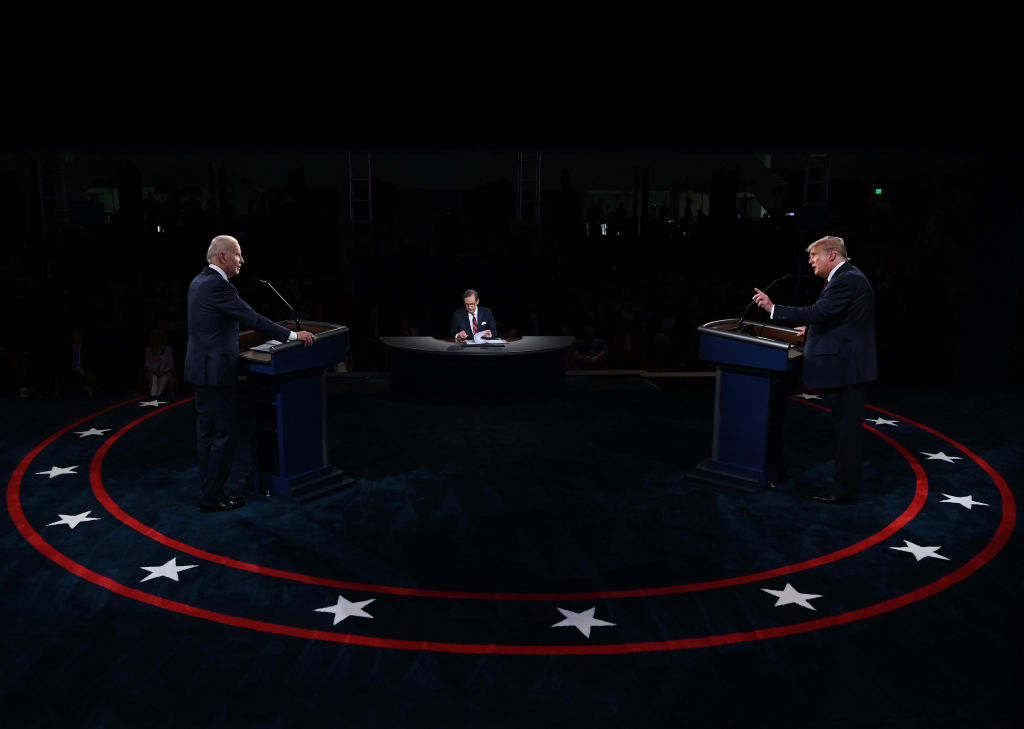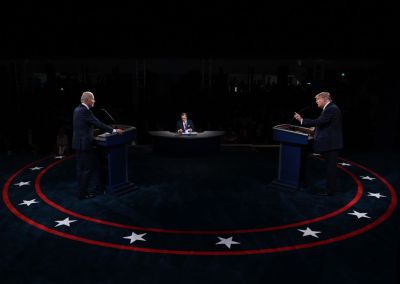Happy Thursday! Robert F. Kennedy Jr. posted a video on Instagram this week introducing the two ravens he’s coaxed into hanging out on his balcony by giving them food every morning. He’s hoping to teach them to eat out of his hand.
Sure, why not?
Quick Hits: Today’s Top Stories
- A Russian court on Wednesday sentenced U.S. Army Staff Sgt. Gordon Black to almost four years in prison following his arrest last month in the eastern city of Vladivostok, where he was visiting the Russian woman he had been seeing romantically. The woman, who apparently alleged that he had stolen about $100 from her and threatened her life, has not been publicly identified. Black denied threatening the woman but pleaded guilty to the theft charge, which the court argued had inflicted “considerable harm.”
- U.S. Central Command (CENTCOM) announced on Wednesday that the U.S. military had conducted an airstrike in Syria on Sunday that killed a top Islamic State leader, Usamah Jamal Muhammad Ibrahim al-Janabi. “His death will disrupt ISIS’s ability to resource and conduct terror attacks,” CENTCOM said, adding that there were no indications of civilian casualties as a result of the strike.
- Hundreds of people have reportedly died from the heat during the Muslim Hajj pilgrimage to the holy site of Mecca in Saudi Arabia, though the exact number of fatalities is difficult to ascertain. Temperatures have topped 120 degrees Fahrenheit at points during the nearly week-long pilgrimage that drew almost 2 million people.
- Russian President Vladimir Putin and North Korean leader Kim Jong Un signed a mutual defense agreement on Wednesday during Putin’s trip to Pyongyang—his first in almost 25 years. The deal affirmed that the two countries would come to the other’s defense if they faced “aggression,” but further details were not clear. The two countries have deepened their military cooperation since Putin’s 2022 invasion of Ukraine, with North Korea seeming to provide ammunition to Russia in exchange for additional spy satellite technology.
- The Senate voted 88-2 on Tuesday to pass a bill that aims to speed advanced nuclear reactor development in the U.S., easing permitting requirements and licensing costs and creating additional incentives for the advancement of the technology. The bill now goes to President Joe Biden for his signature, after a similar bill passed the House in February.
- Louisiana’s Republican Gov. Jeff Landry on Wednesday signed a law requiring public schools in the state to display a copy of the Ten Commandments. “If you want to respect the rule of law,” he said, “you’ve got to start from the original law giver, which was Moses.” The American Civil Liberties Union said it will sue the state over the measure.
What To Expect From Next Week’s First Presidential Debate

Viewers tuning into a debate between President Gerald Ford and then-Governor Jimmy Carter in 1976 were treated to one of the rarest spectacles in politics: 27 minutes of silence. The debate’s audio cut out due to a failed 25-cent electrical component that took nearly a half-hour to find and fix.
Those tuning into the first debate of the 2024 cycle between President Joe Biden and former President Donald Trump on June 27 may be hoping for the same thing.
Next week’s CNN-hosted debate in Atlanta, Georgia, is unprecedented several times over: The contest between two historically old and unpopular candidates—one of whom is a convicted felon—is taking place earlier than any general election debate in recent memory and under fairly unconventional rules. National surveys and swing-state polls have for months shown Trump with a slight advantage over the incumbent, though his lead is often within the margin of error. Will a debate shake up the race?
Usually, presidential debates present candidates—particularly the challenger—to introduce themselves to the broader American public, giving voters who may not have been watching the primary process closely a chance to familiarize themselves with their options. This time, however, Biden and Trump need no introduction: both have served a term as president and have been fixtures in the national media for a half-century.
No, voters know who their options are, and most of them aren’t ...
As a non-paying reader, you are receiving a truncated version of The Morning Dispatch. Our full 1,663-word story previewing next week’s presidential debate is available in the members-only version of TMD.
Worth Your Time
- There is a lot of doomsaying about artificial intelligence and its potential ramifications as the technology advances. In a radically optimistic article for The Economist, Ray Kurzweil envisioned a future dramatically improved by AI. “After working in the field for 61 years—longer than anyone else alive—I am gratified to see AI at the heart of global conversation,” he wrote. “Yet most commentary misses how large language models like ChatGPT and Gemini fit into an even larger story. AI is about to make the leap from revolutionizing just the digital world to transforming the physical world as well. … This will bring countless benefits, but three areas have especially profound implications: energy, manufacturing, and medicine. This is AI’s most transformative promise: longer, healthier lives unbounded by the scarcity and frailty that have limited humanity since its beginnings.”
- In a piece for National Review, Alexander William Salter argued that the U.S. needs to make beating China in a new space race a national priority. “There’s no question about China’s long-term intentions. The CCP views space not as an opportunity for collaborative human flourishing, but a means of solidifying legitimacy at home and increasing its power abroad,” he wrote. “Scott Pace, who served as executive secretary of the National Space Council under President Trump, warns that China’s cooperative overtures are really a bid for control: As with ‘the Belt and Road Initiative, space cooperation tends to be on terms solely determined by China.’ We need to take China’s space threat seriously and to solidify America’s lead in the new space race. What’s required is a plan for space that combines the national interest with global responsibility.”
Presented Without Comment
Bloomberg: Just Stop Oil Activists Spray Orange Paint Over Stonehenge
Also Presented Without Comment
Wall Street Journal: Elon Musk Pitches Advertisers on a Return to X, Months After Telling Some to ‘F’ Themselves
Also Also Presented Without Comment
New York Times: Officer in [British Prime Minister Rishi] Sunak’s Protection Team Accused of Placing U.K. Election Bet
In the Zeitgeist
On Tuesday, Team USA unveiled the outfits American athletes will be wearing in Paris for the opening and closing Olympics ceremonies later this summer. Watch David Lauren, Ralph Lauren’s son, and Olympians and Olympic hopefuls show off the new threads:
Toeing the Company Line
- In the newsletters: The Dispatch Politics team covered House Freedom Caucus chair Bob Good’s nailbiter primary in Virginia, Scott explained (🔒) all that’s wrong with Trump’s “tariffs for income taxes” hooey, Nick analyzed (🔒) the Biden campaign’s decision to go all-in on outrage over January 6, and Jonah critiqued (🔒) Niall Ferguson’s recent essay comparing the U.S. to the Soviet Union.
- On the podcasts: Matthew Continetti of the American Enterprise Institute joined Jonah on The Remnant to engage in some rank punditry and discuss neoconservatism.
- On the site: David Daoud and Jonathan Schanzer detail the growing threat posed by Hezbollah and Bret Devereaux dissects a recent Heritage Foundation report about the strength of the U.S. military.









Please note that we at The Dispatch hold ourselves, our work, and our commenters to a higher standard than other places on the internet. We welcome comments that foster genuine debate or discussion—including comments critical of us or our work—but responses that include ad hominem attacks on fellow Dispatch members or are intended to stoke fear and anger may be moderated.
With your membership, you only have the ability to comment on The Morning Dispatch articles. Consider upgrading to join the conversation everywhere.